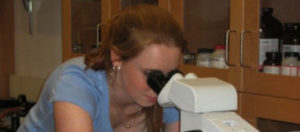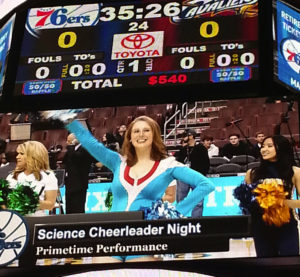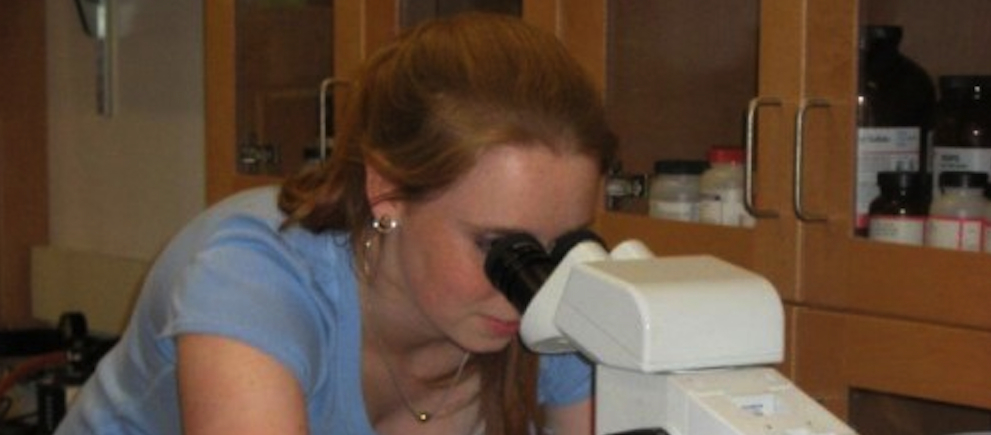
Update, June 2020: We caught up with Hilary for our Keeping Up With the Science Cheerleaders blog series. Read about all the amazing things she’s been up to here!
Update, Oct 2019: Hilary’s impressive research toward developing a treatment for kidney cancer was published in Science Signaling! We interviewed Hilary about her research, and you can also read her impressive publication.
Update, Feb 2018: Hilary was interviewed by the Dana Foundation, a private philanthropic organization committed to advancing brain research! Read our post and the Dana Foundation’s interview.
Howdy, Hilary! Let’s jump right in: what turned you on to science and when?
I am very fortunate to have an incredibly patient mother, and she had an unlimited tolerance for the “why” questions that young children ask. When I would ask questions like “why is the sky blue?” she would always answer with as much detail as she possibly could, and every follow-up “why” would be met with the same effort to explain. When we would get to the end of her patience or knowledge (whichever came first), she would tell me “That’s a question for you to figure out the answer to.” I think responses like that sparked my desire to answer questions that had yet to be explained. I was also brought up with a strong sense of gratitude for the good fortune and good health in my life, and that has made me want to help others who have not had the same opportunities and fortunate situation. I think that’s most likely where my interest in helping cure diseases stems from.
You’re pursuing a Ph.D. in molecular pharmacology and physiology at Brown University. That sounds like a difficult, interesting combination. What put you on that path? What other degrees have you gotten along the way?
I got my BA in biochemistry from Colgate University in the spring of 2012. Colgate is a liberal arts school, and the combination of liberal arts study and advanced science taught me to approach problems from many different angles. The liberal arts helped keep my focus global, while my study in biochemistry allowed me to develop very specific skills for pursuing my science goals. These two paths have actually complemented each other remarkably well, and the combination drew me to the MPP program at Brown. Through this program I will be able to develop my understanding and abilities in drug development and the interaction between drugs and the human body. By learning to navigate these intricate pathways, I will be able to better attack my broader goal of helping cure diseases. The program at Brown also focuses on developing the ability to communicate effectively, which is paramount in science. If you can’t speak clearly and at an appropriate level for your audience, it really doesn’t matter who’s listening.
Favorite and/or most challenging courses you’ve taken so far to prepare for your degree? Why?
My absolute favorite course that has helped prepare me for my degree so far has been Medicinal Chemistry. I really like to know how things work, and for a long time I viewed the human body as a sort of black box when it comes to topics like metabolism and absorption of the things you put into it. MedChem helped demystify these processes, and helped me gain a general understanding of what happens after you put something in your mouth.
A close second, however, is Latin. It may sound strange in terms of preparing me for a degree is molecular pharmacology and physiology, but learning Latin has really helped! The way that each word is modified in Latin to explain the meaning of the sentence and the words around it along with the order of words and other aspects of syntax helped me learn to think of problems more contextually. After my studies in Latin, I try to think of each problem that arises in my science career as a piece of a puzzle, examining how it relates to the pieces around it and to the general issue as a whole. Learning Latin really helped my analytical skills in science.
Physiology is a relatively broad discipline while molecular pharmacology is rather specific—how do you see these two areas interacting?
The program—Molecular Pharmacology and Physiology—may seem two-fold at first glance, but I actually believe the two topics cannot ever be completely separated. Molecular pharmacology focuses on how drugs and the human body interact on a very small and intricate level (hence the “molecular” part). However, I don’t think this interaction can be accurately analyzed without thinking about the larger physiological effects. It’s all well and good if you find a particular drug and its target, but if you don’t know what effect that interaction has on the cell, the tissue, or the organ system, then you’re missing the broader picture. We have to think about every step of the pathway, from a hormone being released to a patient lying in a hospital bed. To use the time-tested cliché, you can’t lose sight of the forest for all the trees, and I think the combination of molecular pharmacology and physiology helps us keep our focus.
Best part of your studies?
My favorite part of studying molecular pharmacology and physiology is the potential. Every day is different in the lab, and you never know exactly what you’re going to find. This past fall I started working with a drug that we expected to have a particular effect, and all of a sudden we found that it has an entirely different effect altogether. Changes like that are exciting and can be fortuitous; I presented my work on the drug last week at the American Association for Cancer Research Annual Meeting. If things had gone as we originally expected I wouldn’t have had the results to present at the meeting, and now we’re looking into the implications of the drug in cancer. The chance that every day you could be working on something that will help cure disease or better human health is what I love most about what I study.
What team(s) have you cheer(ed) for, how long did you cheer for them, and why did you try out to be a cheerleader?

I cheered for the Colgate Raiders in college, for football and basketball. Having been a competitive figure skater before college, I wanted to continue with a team sport. I tried out for cheerleading because of the combination of athleticism and grace that the sport demands, and also because of the foundation of the sport in supporting your community and your teammates. The cheerleaders at Colgate were and are wonderful, they were so welcoming and encouraging when I first came to campus that I wanted to be a part of the team that fostered that kind of mentality.
[More recently, Hilary performed with the Science Cheerleaders during halftime at the Philadelphia 76ers! That’s Hilary, pictured here on the JumboTron.]
Which came first, your interest in science or cheerleading?
Science, definitely. Working in such a male-dominated and challenging field probably stirred the desire for some girl power, though! It’s really nice to be around women who are so strong and driven.
Please describe what you do.
I wake up every morning and go to my lab and do experiments. Right now, I’m trying to learn more about a drug and the target it interacts with. My preliminary work on the drug looks promising for cancer treatment, so I’m trying to understand how it works in a more detailed way.
Every day is a little different, because it always builds on what I found out the day before.
How do the qualities that made you a great cheerleader benefit you in your science studies?
Being a cheerleader taught me commitment and teamwork, as well as enthusiasm and spirit even when things are tough. Science has an incredibly high rate of failure, but it’s important to keep hope and stay positive through all the negative results so that you can learn from your mistakes, improve your skills, and stay with it until you get to have a success story of your own.
Have you faced a situation where you had to challenge a stereotype about cheerleaders [or scientists]?
Often when I tell people I was a cheerleader in college they assume I majored in something that didn’t take much effort, or worse that I didn’t earn my degree through hard work and determination. When I add that I majored in biochemistry, a lot of people put me into a special category of “different” from the typical cheerleader stereotype they have in mind. I think it’s so important to break down the stereotypes about cheerleaders that diminish the intelligence and skills that every individual man or woman on a team has. Every team is made up of individuals, and putting on a uniform doesn’t change the accomplishments or intelligence of the person wearing it.
As for the stereotypes about scientists, there are as many as for cheerleaders. When I started preparing to interview at graduate schools the most common piece of advice I got was to blend in. Don’t wear much makeup, don’t wear a skirt, tie your hair back, minimal jewelry, no heels. I was told time and again that being a woman (and a light-haired cheerleading woman, at that) would work against me, and that in order to compete with men I needed to act like one. People assumed that I would be judged by my appearance and my extracurricular activities, rather than on my interview skills or intellectual merit. Having been through the process and having come out successfully, I can tell you that this is absolutely false. At each school I visited the professors and lab directors asked me thoughtful questions about my lab experiences and projects. One person even pointed out that my cheerleading was an asset, because it made me unique in the pool of applicants.
I really believe that when you talk to or about individuals, the stereotypes that surround scientists or cheerleaders hold very little truth. Now we all need to work to change the perception of the group, and connect the image to the individuals that form it.
Best cheerleading experience?
One of my favorite cheerleading experiences was a clinic my team led at an elementary school near our university. Seeing all the excited children and showing them some of our favorite stunts and dances is always so much fun. One year in particular stands out for me, when we had a captain who was an incredibly strong role model and loved children. She remembered some of the kids’ names who we had seen at other events, and they were all captivated while she told them about how they needed to work hard in school and at practice to grow up to be like us.
Best science-related experience?
My best science-related experience actually happened this past Monday at the American Association for Cancer Research Annual Meeting in Washington, D.C. I attended with my mentor and had a poster to present, for which I was pretty nervous. My career is still in it’s initial stages, and I had performed the experiments we were presenting in very rapid succession several months prior. My mentor asked me to take on a lot of responsibility and stand on my own two feet at the conference, and it was the first time that I really felt like I was a colleague of all the doctors walking around the convention center. Representatives from pharmaceutical companies, government officials, and fellow researchers came by and asked me to run them through my poster, asking me questions about the experiments and the results. In the end my data stirred up a lot of excitement, and I was so proud of my work. I couldn’t wait to get back and move forward with my projects!
If you could rewind the clock and change your degree, would you?
I definitely wouldn’t change my degree. Biochemistry sits at the brink of translational research, which is exactly where I want to be. It’s important to me to have my research be applicable to human health and to understand the reasoning behind my projects on both the large and small scale.
What advice would you give your 12-year-old self?
Explore! And never believe anyone who tells you that your ideas are too ambitious. Being ambitious is a good thing! Whenever something is interesting or you’re curious about something, pursue it. Explore it, find out what it is about that something that interests you, and leave no stone unturned. This is how you figure out what you’re passionate about, and great things come from great passion.
What’s one thing people might find especially surprising about you?
I’m actually the only person in my family who is even remotely related to science. My grandparents, aunt and uncle, and mother all work in interior design, and my sister is a lawyer. But, their encouragement throughout my younger years and continuing now gave me the confidence to break my own trail and pursue what interested me. They are my biggest fans!
Another fun fact about me is that I started out as a figure skater. I skated for 16 years both individually and as part of a synchronized skating team, and competed within the US and in Europe. Synchronized skating shares many aspects of cheerleading like dedication, teamwork, synchronization, and the combination of power and grace. My skating definitely influenced my decision to start cheering!
What are your plans for the future?
I hope to continue doing pharmacology research after I complete my doctorate, ideally in an oncology-focused lab. I would also really like to keep encouraging younger students to get excited about science. I hope to be able to continue to give talks at schools about science and research, and to mentor students in the lab to help give them an idea of what else is out there in the science world besides being a physician.
Why do you want to be a Science Cheerleader?
I want to be a Science Cheerleader because I believe in the importance of breaking down stereotypes and artificial boundaries for better progress in science. I think it is imperative to include people of different backgrounds and genders together in research and medical settings. Everybody brings something different to the table based on what you know and the experiences you have had, and that diversity can lead to advances that may be overlooked when focus is kept too limited.
I also want to help integrate the supportive and collaborative attitude of cheerleaders into research, which all too often involves people trying to conceal or delay the sharing of data from people with similar interests in order to move themselves forward. I think the best and fastest progress comes from many minds working together to solve problems and encouraging each other to reach new higher standards. When I was at the American Association for Cancer Research Annual Meeting last week Katie Couric quoted her mother in a speech, saying “everyone needs a cheerleader.” I find this to be so very true both in science and in life, and I hope to foster the mentoring and supportive atmosphere that I was taught as a cheerleader in my research career.
Learn more about Hilary and her work with the Science Cheerleaders in this video, produced by the Brown Graduate School .

